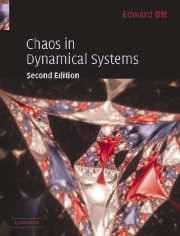Book contents
- Frontmatter
- Contents
- Preface to the first edition
- Preface to the second edition
- 1 Introduction and overview
- 2 One-dimensional maps
- 3 Strange attractors and fractal dimension
- 4 Dynamical properties of chaotic systems
- 5 Nonattracting chaotic sets
- 6 Quasiperiodicity
- 7 Chaos in Hamiltonian systems
- 8 Chaotic transitions
- 9 Multifractals
- 10 Control and synchronization of chaos
- 11 Quantum chaos
- References
- Index
11 - Quantum chaos
Published online by Cambridge University Press: 05 June 2012
- Frontmatter
- Contents
- Preface to the first edition
- Preface to the second edition
- 1 Introduction and overview
- 2 One-dimensional maps
- 3 Strange attractors and fractal dimension
- 4 Dynamical properties of chaotic systems
- 5 Nonattracting chaotic sets
- 6 Quasiperiodicity
- 7 Chaos in Hamiltonian systems
- 8 Chaotic transitions
- 9 Multifractals
- 10 Control and synchronization of chaos
- 11 Quantum chaos
- References
- Index
Summary
The description of physical systems via classical mechanics as embodied by Hamilton's equations (Chapter 7) may be viewed as an approximation to the more exact description of quantum mechanics. Depending on the relevant time, length and energy scales appropriate to a given situation, one or the other of these descriptions may be the one that is most efficacious. In particular, if the typical wavelength in the quantum problem is very small compared to all length scales of the system, then one suspects that the classical description should be good. There is a region of crossover from the quantum regime to the classical regime where the wavelengths are ‘small’ but not extremely small. This crossover region is called the ‘semiclassical’ regime. In the semiclassical regime, we may expect quantum effects to be important, and we may also expect that the classical description is relevant as well. According to the ‘correspondence principle,’ quantum mechanics must go over into classical mechanics in the ‘classical limit,’ which is defined by letting the quantum wavelength approach zero. In a formal mathematical sense we can equivalently take the ‘classical limit’ by letting Planck's constant approach zero, ħ → 0, with other parameters of the system held fixed. This limit is quite singular, and its properties are revealed by an investigation of the semiclassical regime. Particular interest attaches to the case where the classical description yields chaotic dynamics.
- Type
- Chapter
- Information
- Chaos in Dynamical Systems , pp. 421 - 451Publisher: Cambridge University PressPrint publication year: 2002
- 1
- Cited by



